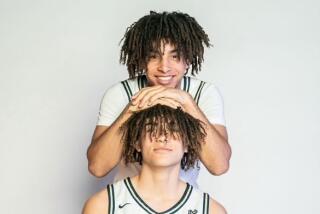DOROTHY LEWIS : Getting Boxed In Didn’t Fit the Plans of UC Irvine’s Star Basketball Player
- Share via
The word was out on Dorothy Lewis long before her diligent high school coach littered the nation’s colleges with letters listing why his protege should be cashing scholarship checks.
Dutch Nichols, coach of South Pike High School in Magnolia, Miss., began the PR campaign because he hadn’t seen anything like Lewis in his 18 years as the Eagles’ coach. What he saw in Lewis was the bruising talent that sent her to play basketball briefly at the University of Arkansas, Little Rock and, finally, at UC Irvine.
Her odyssey from the muddy clay half-court behind her childhood home to the well-structured UCI program is a dual story of the strong pull the birthplace holds and a teen-ager’s resolve to escape a dusty factory town.
Magnolia, Miss., population 2,800. It’s the kind of place where you either work at one of the few businesses, work in the factory manufacturing cardboard boxes or sit on a bench under broad, leafy magnolia trees and gaze upon a comfortable town of musty homes and few roads out.
“I think that for sure basketball is what got Dorothy out of this town,” Nichols said over a crackling phone line from the principal’s office at South Pike High, enrollment 503. “If not for basketball, she would be here working at the factory. She would just be a nobody with a bunch of kids, working her butt off.”
So Lewis got out, or rather, her basketball skills got her out. She’s no Cheryl Miller. She’s not a hyped player in a high-profile women’s program. The UCI women’s basketball team is enjoying a 20-6 season (6-2 in the Pacific Coast Athletic Assn.). The Anteaters begin play in the PCAA Tournament Saturday at Crawford Hall. The first game is at 6 p.m.
After a sluggish start, Lewis is playing well. The senior forward’s numbers are modest--13.1 points and 6.8 rebounds per game.
But Lewis is winning: she doesn’t work in a factory and she’s not a nobody.
Lewis grew up fourth from the bottom in a family of 15 children. The extended family lived in what became a Lewis conclave--five houses in a semi-circle at the bottom of a gully. Rowdy, competitive, hard, full of love--that’s how Lewis remembers growing up.
“She started playing in that court out behind her house,” Nichols said. “It wasn’t much. After a little bit of rain, why, it became a mess of mud. Then there was the backboard. It was kind of twisted off to the right. So you had to get used to that.
“But there was always a lot of kids out there. And there was always a ball out there. It may not have been always filled with air. . . .
“Dorothy was always playing with the boys, and I think that helped her game, I think that helped prepare her for college. Then, it goes back to Mississippi. The girls here are tough. It’s nothing for them to play ball and run for 40 minutes straight. There’s not much to do here, like there is out there. The girls grow up playing ball.”
Lewis was no different, only taller and better. By the seventh grade she stood 6-feet and was playing on the Eagles’ varsity. (Under Mississippi rules, a sixth-grader is eligible to play varsity high school sports.)
“We knew the college scouts were always there looking at the seniors,” Lewis said. “But Coach Nichols kept telling me they were looking at me. I was just a baby. I didn’t know what it meant. Then, I figured it out.
“I made up my mind in 10th grade that I was going to get a scholarship. Coach kept telling me that if I wanted to play ball, I had to keep my grades up. I knew that.
“It was so important to me. I was the only one of my family to go to college. My people are very proud of me.”
In the seven years Lewis played for South Pike, the Eagles lost only eight games. College recruiters were drawn to the sleepy town to look at Lewis and her teammates.
From among the scholarship offers, Lewis chose Arkansas, Little Rock in 1980. After less than a month there, she was ready to come home.
“We didn’t have a real close team, and I had been used to that,” Lewis said. “We also didn’t work hard, straight off the bat. I sure had been used to that. You lagged if you’re not made to do things. I pretty much knew right away I wanted to leave.”
Before she could pack, misfortune found her. Lewis was going up for a rebound in practice one day and was hit low. Lewis’ 6-1 frame came crashing to the floor. Her back audibly crunched underneath her.
“I couldn’t feel anything for a little while,” Lewis said quietly, as if reliving the pain. “I remember lying on the floor saying, ‘I’ll never touch a basketball again, I’ll never touch a basketball again.’
“Paramedics came and took me to the hospital. The doctors told me I had a cracked back and that it would be dangerous for me to play for a long, long time. I begged to leave the hospital and they finally let me go.
“While I was laying up in the hospital I thought about not playing again. I thought, ‘It’s not broke, it’s just cracked.’ I thought as long as I can walk, I can play. So I bandaged myself up real tight and played in the next game. I couldn’t bend or twist or even jump, but I could play.”
Lewis went home for spring break that year and never returned to Little Rock. She went home and sat under the magnolia trees. She played in pickup games for hours every day. Then she got a call from childhood friend Kevin Magee.
It was a call that set Lewis’ life back on the road she had mapped three years before.
“I first saw Dorothy when she came out to visit Kevin,” UCI Coach Dean Andrea said. “She walked into my office--it didn’t take a genius to see that with that athletic body she could do some good.”
Andrea had a preview of Lewis’ visit, with Magee as tour guide.
“She’s really something,” Magee told him.
Andrea had reason to trust Magee’s judgment. The man from Magnolia had been making believers out of opponents of the UCI men’s team. Now, he wanted to bring in reinforcements for the women.
“I don’t think she expected much from this team at first,” Andrea said. “But when she eventually started playing she told me we had a good team. Of course, Dorothy is the kind of person who would play with four dogs and her first comment after the game would be to praise them.”
Lewis was a hit her first season in 1983. And Irvine was a hit with her. Because of the lingering racial prejudice Lewis experienced in Arkansas, she was wary of settling in predominantly white Orange County.
“When I came out here I didn’t want to be as sociable, I didn’t want to get hurt again,” Lewis said. “But the people were so nice. All of a sudden I started to open up. The people on the team were so nice.”
Cheri Graham, the Anteaters’ center and leading scorer, said that in Lewis the team has found a warm shoulder.
Lewis flourished. Basketball was great and school was great. She majored in physical education, but then began to migrate to social work--she wanted to help kids as she had been helped by a high school counselor.
Lewis was on the path. But no one ever said it would be a straight road.
In 1984, Lewis went home again. While her basketball life was smooth, Lewis said her personal life was unsettled. She longed for the simplicity of life on the Delta.
She spent the year in Mississippi with her 5-year-old daughter, Bernadetta. Lewis, who is not married, had brought Bernadetta with her to California. The child stayed with Lewis’ sister in Compton. It was a neighborhood where bars are on windows and gates are kept locked.
“She’s like me, energetic,” Lewis said. “She doesn’t like to be locked up. I didn’t want her to live that way. I wanted her to be free and grow up like I had. So I sent her to Mississippi to live with my mom, who had wanted her all along.”
When she felt settled, Lewis returned to Irvine. She said the year at home helped her collect herself and redirect her energy back to school and basketball. And life after basketball.
“We make no bones with our players that there is no life after college basketball for women,” Andrea said. “I always say, ‘Use basketball, don’t let it use you.’
“For Dorothy, I’ve had some offers from teams in Europe. She’s the kind of player they want--intense and aggressive.”
Lewis isn’t sure about Europe, although she said she has an open mind. She isn’t sure about coaching, either, although she may help UCI next season. She’s pretty sure about social work, but not about when and where.
What she can say for sure is someone else will have to make the cardboard boxes.
She’s got other plans.
More to Read
Get our high school sports newsletter
Prep Rally is devoted to the SoCal high school sports experience, bringing you scores, stories and a behind-the-scenes look at what makes prep sports so popular.
You may occasionally receive promotional content from the Los Angeles Times.







